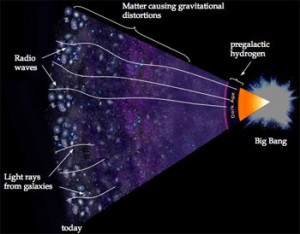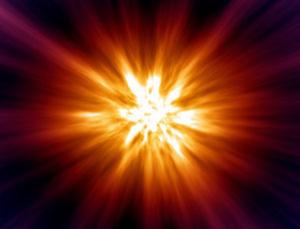I had posted this previously, but there are some posts and info that should be revisited. This is one of them.
Scientifically this is big news. In the January 2012 edition of New Scientist Magazine it was stated that scientists are now facing up to the problem of the universe having a beginning – until recently they could postulate that it was eternal and the main theories to support this were “eternal inflation” and “multiverses”.

The New Scientist article is here (but you will need a log in so I have supplied the article below).
Why Physicists Can’t Avoid a Creation Event
The big bang may not have been the beginning of everything – but new calculations suggest we still need a cosmic starter gun. You could call them the worst birthday presents ever. At the meeting of minds convened last week to honour Stephen Hawking’s 70th birthday- loftily titled “State of the Universe” – two bold proposals posed serious threats to our existing understanding of the cosmos. One shows that a problematic object called a naked singularity is a lot more likely to exist than previously assumed (see “Naked black-hole hearts live in the fifth dimension“). The other suggests that the universe is not eternal, resurrecting the thorny question of how to kick-start the cosmos without the hand of a supernatural creator.

For a while it looked like it might be possible to dodge this problem, by relying on models such as an eternally inflating or cyclic universe, both of which seemed to continue infinitely in the past as well as the future. Perhaps surprisingly, these were also both compatible with the big bang, the idea that the universe most likely burst forth from an extremely dense, hot state about 13.7 billion years ago.However, as cosmologist Alexander Vilenkinof Tufts University in Boston explained last week, that hope has been gradually fading and may now be dead. He showed that all these theories still demand a beginning. His first target was eternal inflation.

Crucially, some versions of eternal inflation applied to time as well as space, with the bubbles forming both backward. But in 2003, a team including Vilenkin and Guth considered what eternal inflation would mean for the Hubble constant, which describes mathematically the expansion of the universe. They found that the equations didn’t work “You can’t construct a space-time with this property,” says Vilenkin. It turns out that the constant has a lower limit that prevents inflation in both time directions. “It can’t possibly be eternal in the past,” says Vilenkin.”There must be some kind of boundary.”
Steve Ray here: I have always said that when scientists finally get back to the final, final beginning and break through the last mystery to the first cause, they will peer around the last corner and be surprised to see God smiling at them saying, “Yes it is Me. I created everything from nothing and made you in My image!”



This Post Has 12 Comments
Despite being a lifelong Star Trek fan, I’ve always believed that the multiverse theorem, although helpful as a story-telling gimic, is simply inconsistent with the nature/personality of God. If a new universe was created every time anyone or anything was faced with two distinct paths to take, then no choice we ever made would have any meaning. Thus, for every person, an infinite number of copies of that person would both end up in Heaven and in Hell. If that’s the case, then what’s the point of Jesus’ Passion? Nothing would matter. The only philosophy that’s consistent with the idea of the “multiverse,” then is nihilism, which is utterly inconsistent with God’s divine plan. So… I’m glad that the scientific community is once again being forced to face the fact that what we do in this life really does matter… especially to the One who gave us life. 🙂
Actually even an “eternal” universe has a fundamental problem from the perspective of physics. Energy conservation is well established so declaring that the universe exists poses a problem. Further one needs an explanation of why the laws of the universe are as they are.
Even an “eternal” universe must explain why it exists. And science can’t do that.
Pingback: The best evidence for Creationism - Page 73 - Christian Forums
The Vilenkin-Guth argument is dealt with in depth by Fr Robert Spitzer in his DVD “The Heavens Proclaim the Glory of God.” (Available from EWTN). Fr Spitzer of the Magis Institute is a Catholic priest involved in Science and Reason. He goes through several modern scientific argument for the existance of an intelligent omnipotent Creator, and he also goes into the statistical unlikeliness of the existing cosmological/physical constants. The Universe’s very existance seems to balance on a knife edge of infinite thickness. Not just one or two coincidences, but several dozen! And nobody has an explanation except the theologians! Anyone who claims to be “scientific” cannot ignore the truth wherever it leads. I have yet to hear any scientist explain “Why is there something rather than nothing?” Take off the materialist blinders and open your eyes to the glory in front of you.
The unlikelyhood of an eternal past can be demontrated simply in ordinary conversation: Tell the scoffer, “If time had an infinite past, and everthing in the universe tends towards increasing entropy (like a broken teacup which has a real hard time reassembling itself) then why isn’t everything in the universe broken down already? There you have a nice simple argument for a beginning to time.
The scientific community was also stunned by this report. In a massive genetic study, senior research associate at the Program for the Human Environment at Rockefeller University Mark Stoeckle and University of Basel geneticist David Thaler discovered that virtually 90 percent of all animals on Earth appeared at right around the same time. This conclusion is very surprising,” says Thaler, “and I fought against it as hard as I could.” https://www.techtimes.com/articles/228798/20180530/massive-genetic-study-reveals-90-percent-of-earth-s-animals-appeared-at-the-same-time.htm
So much for the theory of evolution. Sometimes the obvious stares us in the face.
Of course, since God created the universe ex nihilo, science can never discover this. It needs material reality for science to be science, and the nothing of ex nihilo is not a material thing to be measured or observed even though some atheist scientists have tried to claim that the nothing is really something (like a vacuum), which is nonsense.
The best that science can ever do is illustrate the many difficulties with a non-beginning of our material universe in time (gravitational paradox and visual paradox pretty much did this long before Vilenkin et al.), and also point to the cosmic event of the Big Bang bringing about the expansion of the galaxies, but it can never, ever touch ex nihilo, and the Big Bang also does not qualify as ex nihilo (some naive believers in God sill promote this wishful thinking, wrongly citing Fr. LeMaitre who also made it clear that the Big Bang could not be held as creatio ex nihilo). As such, there is no “may” about the Big Bang being the beginning of everything, and there will be no peering around any last corner to see God via science.
This is one of those times when the sciences of physics and logic cross paths. Logically, everything material must have a beginning. Docent is quite correct in saying that there is no corner to peer around to see God. The Greek logic, extended, to include the Almighty as the Alpha and the Omega of the material, and by implication also spiritual, world is the only posit that fits a logical theory and thus the physical universe. Much energy has been expended by non-believers to attempt to prove otherwise and their final position is usually some version of “I don’t know”.
I love it. Anyone who wants more should read The Science of God; The Convergence of Scientific and Biblical Wisdom, by Gerald L. Schroeder, a physicist who follows the findings of biochemists, paleontologists, and physicists to show that the latest science an close reading of Genesis are “not just compatible, but interdependent”
Some things to think on…… So much time and energy spent on something already known. Perhaps spend time on understanding the Book of Genesis, as in, was the place where Adam and Eve were created, this physical earth, or was it in the spirit world. If in this physical earth, where are the cherubims protecting the way back into the garden. How long did Adam and Eve live before the Original Sin was committed. Did God kill animals for their skins? Or was it then, after the Fall, that they were clothed in physical human skin. Why is it recorded that Adam left the garden, and no mention of Eve. And, science can never tell that it has found material that was a part of creation before the Fall. As for all of this having no beginning, what was the Big Bang composed of? God is wholly orderly, as in Genesis, step by step. God bless, C-Marie
The paradox is scientists using material and minds within OUR universe to peer outside of it. It’s a bit like saying I’m going to look around space before I was born. There’s no physical theory that could even conceive of designing an experiment to do this, and as we know, math, while we create equations to imitate and model nature, aren’t creative themselves.
A theory of multiverses probably derives from quantum theories where, for example, a thing, such as a photon, can inhabit two opposing states at the same time. Until someone invents a grand unified theory, we will be (as John Candy used to say) “playing pick-up sticks with our butt-cheeks”. Even then, if there is some primary force or particle no one has yet seen, we would have to learn of its Genesis, to borrow a word.
No one can see God
But We can see the Works of God
Thanks for sharing this! All the best!
Comments are closed.